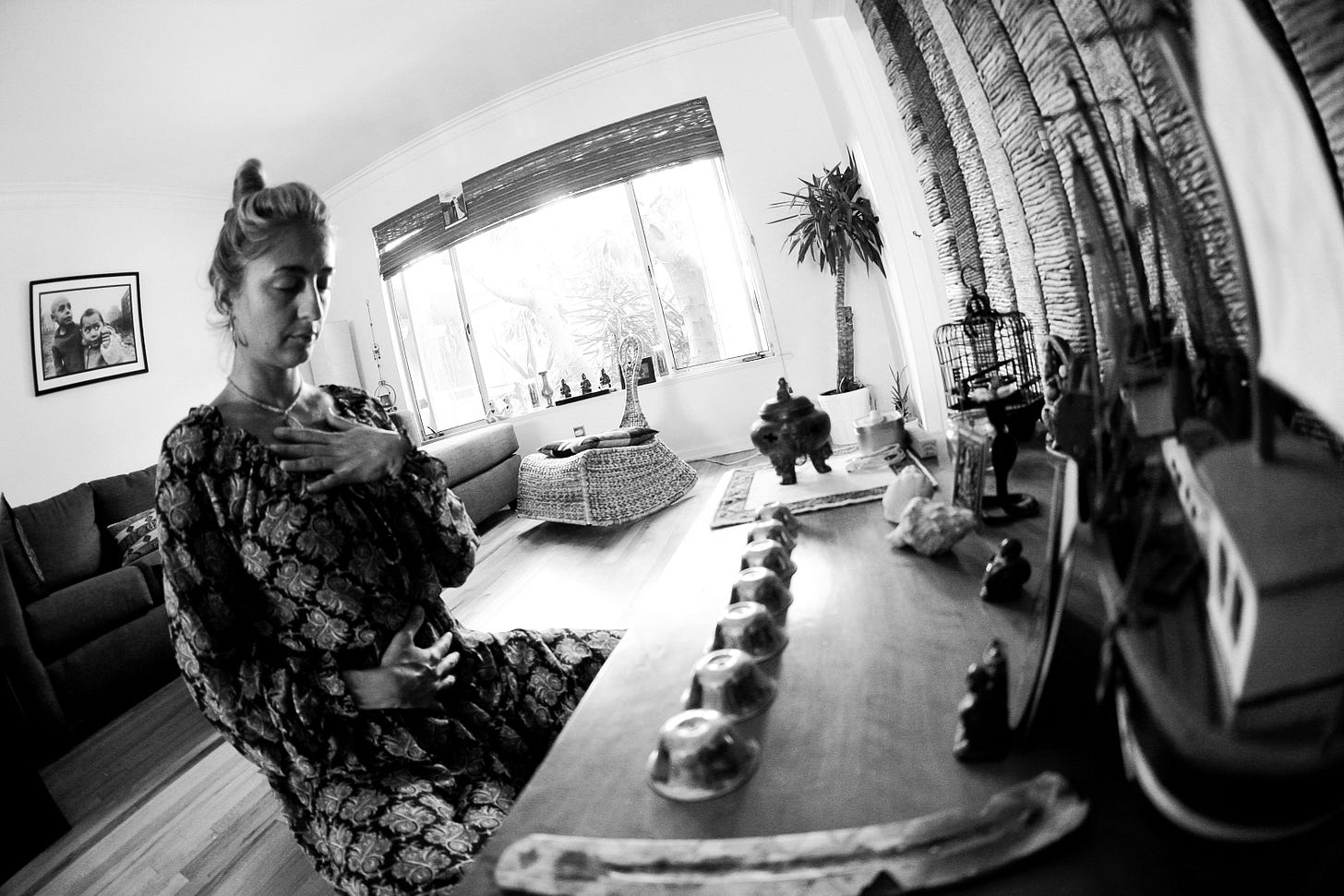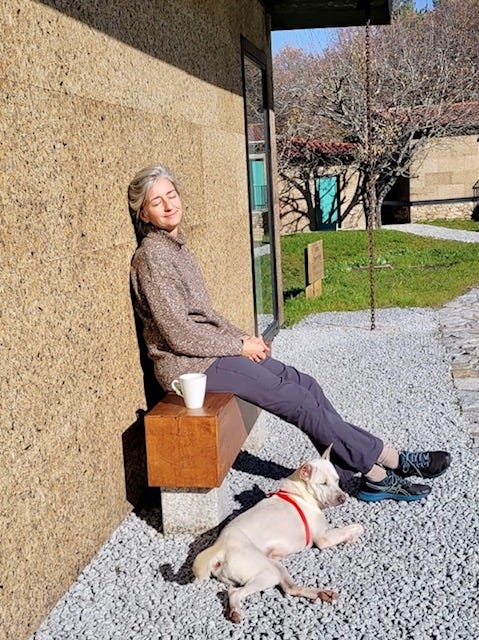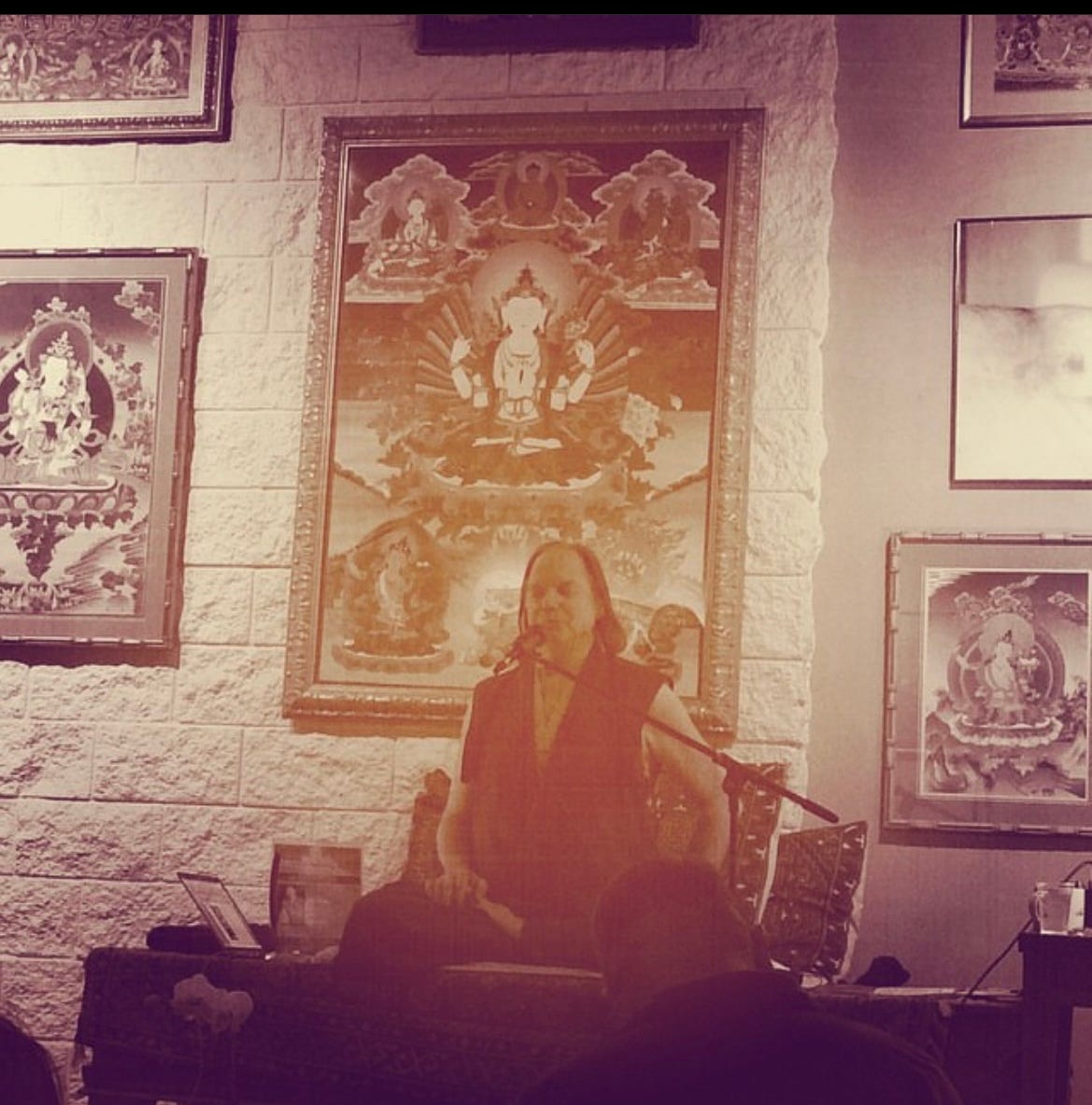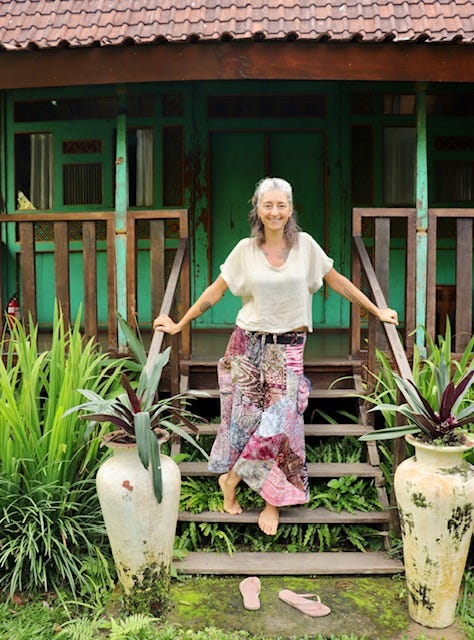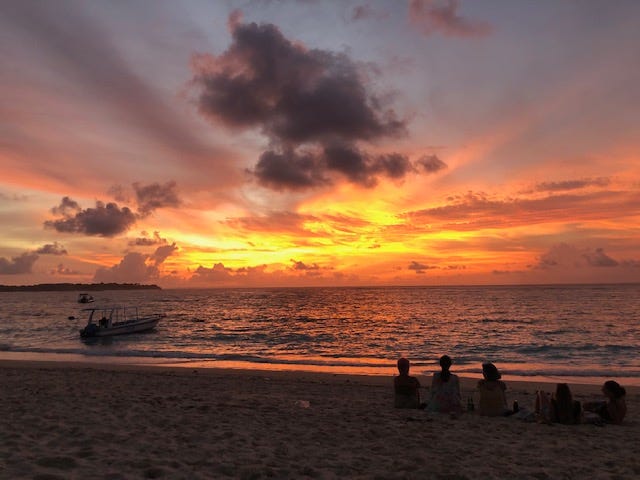“I thought of happiness, how it is woven
Out of the silence in the empty house each day
And how it is not sudden and it is not given
But is creation itself like the growth of a tree.
No one has seen it happen, but inside the bark
Another circle is growing in the expanding ring …
… For what is happiness but growth in peace”.
~ May Sarton
I don’t know about you, but when someone asks me if I am happy, I usually ask for clarification - am I happy in general, am I happy in this particular moment, am I a happy kind of person - what exactly do they mean by that question. There are so many nuances to the respond I can offer - sometimes even “I am not too unhappy” (meaning, things are not painful) will suffice. But, I will tell you something for sure, I am not really a happy gal.
Recently I have been asking myself and reflecting when was the last time I was happy; truly happy. It took some time to contemplate on this question, but then I realized that it was so because I was looking for a big, grandiose moment (or rather a long period of time) that I would pinpoint as happiness. I was looking for something concrete that happened in my life and “made me happy.” And if nothing large, exciting and life changing didn’t happen, I wouldn’t call it happiness.
I didn’t find any of these grand moments. At least not in the recent period.
But then I realized that there are so many short, daily, minute moments in a day when glimpses of happiness arise - like when I wake up and the sun rays are coming through the window and into my room, when I take Mala outside and watch her run the circles around me excited to be outside and free, when I make a cup of coffee and sit to read a book, when I smell a tree (there are many jeffrey pines in Big Bear and their bark smells of vanilla and butterscotch), after I meditate, when I hear something nice from a dear person, or when I see someone does something nice for the other person. These moments may seem irrelevant, and in times when I am in the grip of depression they certainly seem to go by unnoticed, but they are what true happiness is made of.
In my past life (I refer to my past life as the time when I was not sober, so anything prior to September 2014), I have been chasing after intense experiences and I have considered them to be “happiness”. Basically, happiness was when I am in a great mood, ecstatic, or those times with lots of fun and no responsibilities. Anytime I would have had butterflies in my belly, when my adrenaline was through the roof, when I put myself in dangerous, unskilful and risky situations, when I would get obliterated from the booze or so high on cocaine that I would have become anxious, euphoric, had a sense of superiority to others, felt restless, and consider myself almost invincible - I would call these moments happiness. I was so delusional. Because once any of these (fleeting) moments would have passed, I would have fallen into a deep melancholy, sadness, depression and sense of meaninglessness, or, at best, indifference about the world around me and my life.
After getting sober, I have realized how deeply unhappy I actually was in those moments of so called happiness. I have finally seen how miserable and empty my life has been, how spiritually dead I was, and how I have lost so many incredible moments of real and deep connection with people and life itself, because of the abuse of alcohol and drugs; because I was not present in my life. It’s not just those times when I was actually drunk or high that were problematic, it is everything in between - my mind, the shitty thoughts, severe mood swings, obsessing about drinking or using, planning to stop, trying to manage it, lying to others and myself - all of these moments stole my life from me. I have lost touch with any kind of simple human pleasures; simple pleasures of life. Granted, there were many beautiful and meaningful moments even during my drinking and using time, but frankly, I can’t remember most of them. That’s another thing about alcohol and drugs - at least in my experience - my memory is super hazy of life going on around me at that time.
So, right after I got sober, I have experienced a certain rush of energy and excitement, which also is a kind of happiness (not a sustainable one, as it turned out), or at least I thought so. This is referred to “being on a pink cloud” in the recovery world. For about 90 days straight I was doing very well; too well, I should say. My mood was up, I was positive, cheerful and friendly, I easily connected with others and the world, and generally, I was happy about my life even though I wasn't drinking or using any substance. There was happiness and satisfaction around the fact that I gave up a destructive behavior. However, after those three months have passed, I have had a major meltdown. All of a sudden, I was very emotional and sensitive, easily crying, and I could not find happiness and satisfaction anywhere around me. The thing is, when you are in an active addiction, you really don’t know how to feel happy, joyful, satisfied, content or fulfilled without the substance. We reach out to the substance in order to feel these feelings, and, often, simply to feel “normal”. But once we are clean and there is no crutch to help us function like “normal people”, we don’t know what to do, how to live and where to find happiness (this is why those in recovery from addiction need a community of like-minded people).
During the time I was drinking and using I didn’t know how to touch and “achieve” that state of happiness without substances. A sunset was not pleasant enough and had to be paired up with wine, plane ride had to be backed up by a lot of booze, a weekend would not be complete without a blackout, a music concert could not be enjoyed without ecstasy, I wouldn't ever go out and consider not ordering a drink, and I would not engage, go on the date or have sex unless I am drunk. In my mind, I was (most often) using mind altering substances in order to be relaxed, positive, cheerful, likable, happy, and I would not even consider experiencing these things, or life itself, sober.
When I got sober, all of a sudden, I was lacking in these experiences - I wasn’t partying and going out, I wasn’t putting myself in any extreme, dangerous and exciting adrenaline activities, I wasn’t engaging sexually with random and unknown people, I wasn’t attending events that used to trigger my drinking habit - and, therefore, for some time I did not know how to live without a substance and be happy and joyful. Granted, overall I was doing well, and was satisfied with my choice to live free from drugs and alcohol, but I didn’t know how to feel that feeling that I used to call happiness. And I certainly did not get sober to be miserable. I needed a manual for this new life. I had to find new ways to enjoy myself. Or, consider some of the old ways that I had enjoyed before I was an addict, or things I have always wanted to do but I never dared to try.
It took some time to get there, but eventually I did. I took my recovery seriously it has been my priority - and I also found new things that make me happy and that I enjoy. These days, for me, that is spending more time in nature, investing more time in self-care and self-inquiry, meditation and yoga, spending more time alone and in silence, helping others and being of service, and certainly attending to my spiritual and inner life - spirituality as a sense of connection to something higher and bigger than just me.
Of course, what I didn’t know back then is that happiness has nothing to do with the outside factors. I didn’t know that I don’t need to change the circumstances of my life in order to feel happy. And, I didn’t know that what I considered happiness were merely moments of artificially induced excitement (which is borderline anxiety on the body level, actually). For some of you, this may have been a known fact for a long time now; but, for me, and for most addicts, this was a complete novelty. And, I don’t mean that intellectually I didn’t know this, but I never lived like this, I never practiced this knowledge, never felt it in my bones and expressed it in my actions. I just lived with this idea that the greatest goal in my life is to be happy, and that I will fulfill this mission by doing whatever I want to do and whenever I want to do it (most often partnered with drinking and using).
I was introduced to Tibetan Buddhism and my teacher sometime in 2013. But I don’t consider myself being a dedicated and serious student of this amazing philosophy until the moment I got sober - which was September 2014. You may wonder why this is the case. Simply because a serious Buddhist practice cannot be done in the presence of mind altering substances. When the mind is altered, one will more easily engage in unskilful speech and actions, will possibly hurt others and themselves, steal or lie, will probably more easily engage in sexual misconduct, and will not have a clear mind to sit and meditate, but rather a monkey mind that jumps from one issue to another. Just think about it - when you are drinking, even if you are just buzzed and not completely drunk, what is your behavior like, what are your thoughts and words like, and how likely are you to do things that otherwise you wouldn’t.
Buddhism also says that the cause of suffering is craving and clinging, as well as the aversion, and the ignorance about the world and its workings. This is what the addiction is about - craving for pleasure and aversion to pain, and doing everything possible to feel more pleasure and avoid pain, even when those actions are hurting us and/or others. The ways that we can understand ignorance, for example, is by believing that things and people will bring us happiness, and that it will last forever (basically, not believing in impermanence of things). Finally, Buddhism also teaches us that the road to happiness is understanding what suffering is and its root causes, as well as letting go of things. Of course, I am overly simplifying the teachings here, but just in order to paint a picture.
When I started studying Buddhism more closely and in detail in 2014, I have discovered that my life revolved around drinking and using and that I needed to renounce that kind of thinking, and that kind of living, in order to be free and be happy. And that’s what I did. I have rejected and abandoned life which involved mind altering substances, attempts to pursue happiness through them, and ignorance that comes with it. It wasn’t and hasn’t been easy, but I never looked back and I never wished to have my old life back. The question did remain though throughout my life, how do I find simple pleasures and joy in relationships and my every day life. Somehow, with time, I started defining happiness more as contentment. When I am content with myself, and able to accept how things in my life are, I am happy.
“Make of yourself a light,”
said the Buddha,
before he died.
I think of this every morning
as the east begins
to tear off its many clouds
of darkness, to send up the first
signal - a white fan
streaked with pink and violet,
even green.
… Even before the sun itself
hangs, disattached, in the blue air,
I am touched everywhere
by its ocean of yellow waves.
No doubt he [the Buddha] thought of everything
that had happened in his difficult life.
And then I feel the sun itself
as it blazes over the hills,
like a million flowers on fire -
clearly I’m not needed,
yet I feel myself turning,
into something of inexplicable value.”
~ Mary Oliver, The Buddha’s Last Instruction
Now, we do need to understand and accept that life happens to all of us, regardless of one being sober or not. We are all in recovery of some kind. Things can get tough and painful, and they most certainly get beautiful and bright too. There is no formula to having only good things happen to us, and you are not failing in life in case you experience difficulties and struggles. It is a common experience that all of us humans share. I can say that I experienced some of the toughest times of my life in my sobriety - I have relapsed for several months in 2016, many dear people in my life were getting sick and dying, or overdosing and committing suicide, I have lost jobs, money, experienced financial insecurity, lost friendships, relationships, and I have felt my feelings much stronger than when I was anesthetizing myself with alcohol and drugs. I also got to know myself better, I learnt how to be alone and enjoy it, I have built deeper and more honest relationships with people, I travelled, enjoyed the nature and its wonders, and I was and am able to be honest about my actions.
“Remembering how good my life is, despite the moods, is one of the keys to what I define as happiness.”
~ Kevin Griffin, Recovering Joy: A Mindful Life After Addiction
One of the things that was (and in a way, still is) most devastating for me in my sobriety was the diagnosis of depression. It took a while to accept that this can happen to me too, and that I don’t need to be ashamed about it. For me, depression shows up as a deep melancholy, lethargy, a particular state where it is difficult to get out of a negative mind states and low energy in the body, as well as a lack of a belief that things will get better. In this state it is difficult, if not impossible, to turn towards things that otherwise I enjoy and that make me feel good. It is difficult to turn towards my practices, although I know that many, if not all, of them would work.
Recently, I have realized that my depression shows up (and it is independent of) even when things on the outside look OK - that is, I am not necessarily unhappy but I am feeling depressed. I would observe my life and note that I am healthy, I have friends and family who care for me and support me, I am financially independent, and I find satisfaction in my work. I can choose where I want to live and I feel free to make decisions on my own. And yet, I can still be depressed. It may not be the only thing I am feeling, but it is certainly the most dominant one.
In those heavy and dark states, what helps me is just to continue to be, continue to breathe and keep going. Get up, straighten the bed, drink some warm water with lemon, take Mala for a walk. Maybe read something uplifting and inspiring, write a few lines, or do the next thing in my schedule, even though I cannot show up the way I wish I could. What Twelve Steps of Alcoholics Anonymous teaches us is to keep showing up. No matter how, but show up; show up as you are. And, sometimes, that’s all I can do.
Realization (and admission) that I need to take responsibility of my own happiness helps me, as well as continuing to do things that are good for my mood. In Buddhism we learn about cultivating “positive mind states”, and our own accountability for how we live our life. This takes away the sense of a self-pity and blame that I sometimes feel towards the whole world, as well as the victim position and the notion that “thing happen to me.”
The Buddha defines happiness in many different ways. He certainly points out that there is a pleasure that we receive through our senses. But, in contrast to our popular belief, these pleasures are lacking, fleeting and ultimately unsatisfactory, due to their impermanent nature. We don’t need to write them off completely, as humans do need certain amount of comfort and pleasure in order to remain positive and hopeful. But, we need to be careful about the attachment to these pleasures and therefore, disappointment when they end. So, the most skillful way to enjoy these is to enjoy them but not see them as the only and ultimate source of our happiness.
More of a lasting pleasure and freedom, according to the Buddha, would be the joy that we get from calm, peaceful meditative mind. In this state, there is no lacking, no craving and grasping, no aversion, but just deep sense of contentment, acceptance and joy. We can get into this state through meditation, a walk in the nature, silence and solitude. However, cultivating these states of mind requires deep dedication and regular practice. And this is where our own responsibility and accountability comes in. It is not something that offers a quick, instant, gratification like having a few beers or smoking a joint, but rather something that takes time, dedication, and practice.
Living a spiritual life - life of a meaning and purpose higher than ourselves - brought me - and still is bringing - joy and happiness. Asking myself if I am doing things that make me happy, and if those things benefit only me or also others, is the place to begin, and a place to go back to when I am feeling blue. And, it is equally important to remember that each day is different, and that each day I get a new chance to begin again, to show up. As Kevin Griffin says, “a spiritual life is almost always about renewal. There’s this constant renewal. Again, because everything is impermanent, you get it and then you lose it. You can’t recreate it in exactly the same way.”
How happy is the little stone
That rambles in the road alone,
And doesn't care about careers,
And exigencies never fears;
Whose coat of elemental brown
A passing universe put on;
And independent as the sun,
Associates or glows alone,
Fulfilling absolute decree
In casual simplicity.
~ Emily Dickinson




